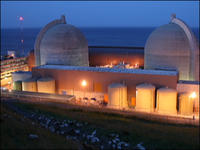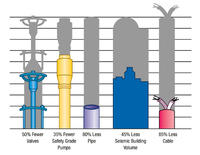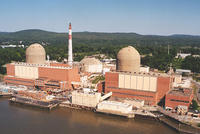-
Indian Point 50-mile evacuation plan unrealistic
Located only thirty-five miles north of New York City, the most populous area in the United States, is the Indian Point nuclear reactor; safety officials are questioning the wisdom of operating a plant so close to New York City; a fifty mile evacuation radius around the plant would affect nearly twenty million people and some say evacuating that many people on short notice is a “fantasy”; NRC is currently conducting a thorough safety review of U.S. nuclear plants and the Indian Point reactor is one of seventeen under scrutiny; New York Governor Andrew Cuomo recently called for the plant to be shut down
-
-
Businesses cannot defend against cyber attacks, expert says
In a recent testimony before Congress, a cyber security expert warned that the private sector in the United States has proven unable to defend the nation’s critical cyber infrastructure from attack; businesses own 85 percent of critical infrastructure and they have not invested in the skills or technology to secure it from cyber attack leaving the electrical grid, financial services, and other key elements vulnerable; foreign intelligence agencies, organized gangs, and corporate spies have successfully infiltrated banks, multinational corporations, and even government websites and stolen sensitive data; cyber security experts urged for greater government regulation to secure U.S. networks
-
-
Alstom acquires CA company, seeks to enter U.S. smart grid market
French electrical grid manufacturer Alstom recently acquired Utility Integration Solutions, Inc. (UISOL) in its efforts to expand its smart grid control room capabilities and enter the U.S. market; UISOL specializes in demand response management systems, which are critical to the operation of smart grids; analysts believe that this could put Alstom in position to become an integrated systems provider for smart grids in the United States on par with ABB, Siemens, and General Electric
-
-
Marines complete largest solar power system yet

The U.S. Marine Corps recently completed construction of a 1.4 megawatt solar electric system at Marine Corps Base Camp Pendleton; the solar installation is currently the largest system installed to date on a Marine base; the new system is expected to generate 2,400 megawatts each year and power roughly 400 homes; it will save the base $336,000 in energy costs annually; on Monday, the Corps announced a comprehensive strategy to harness solar energy in Afghanistan to reduce fuel consumption and save lives
-
-
California schools seismically unsafe, lack funding for retrofits
Hundreds of thousands of students across California are at risk, as school districts have not retrofitted aging concrete buildings that are susceptible to collapse; the state has identified dozens of structures at schools that are at risk of collapsing in a strong earthquake, but most are still in use and have no plans for repairs; engineers are particularly concerned about old concrete school buildings that were erected before 1976; these structures are constructed with “non-ductile” concrete, a type of material that did not hold up well in the recent earthquake in New Zealand; cash-strapped school districts are hesitant to begin long and expensive retrofitting projects even with state help
-
-
After EPA fine, mining company building $200 million water treatment plant

America’s largest underground coal mining company, Consol Energy, is constructing a $200 million water treatment plant in West Virginia, after being fined $5.5 million by the Environmental Protection Agency (EPA); in 2009 discharge from Consol’s mining operation caused a toxic golden algae bloom that killed aquatic life along thirty miles of Dunkard Creek; the advanced waste water treatment plant will be the largest facility in Appalachia; the plant will be capable of treating 3,500 gallons of water per minute and will remove more than forty-three tons of dissolved solids, including eleven million pounds of chloride
-
-
Drought-prone pasts may foretell New York's and Atlanta's futures

By fall 2007, during the second year of a three-year drought, Atlanta had roughly three months’ supply of water remaining while Athens, Georgia was down to approximately fifty days; another drought dramatically lowered New York City reservoirs to 33 percent of capacity in 1981; droughts in those cities and their surrounding regions were typically longer and more frequent centuries ago than they were for most of the twentieth century; a return to historic climate patterns would bring more frequent and prolonged droughts
-
-
U.S. reconsiders nuclear plant sites amid safety review

Following the nuclear crisis that occurred in Japan as a result of a massive earthquake and tsunami, the United States is undergoing a thorough safety review of existing plants that may affect where new plants are located; President Obama ordered the Nuclear Regulatory Commission (NRC) to conduct a comprehensive safety review of all nuclear plants in the United States; observers are particularly concerned with the Indian Point nuclear power station located forty miles north of New York City; if an accident were to occur, up to twenty million people, including eight million in New York City, would have to be evacuated
-
-
Lodi, CA considers privatizing $36 million water plant
The city of Lodi, California is in the midst of building a new $36 million water treatment plant, and is considering privatizing the facility; the new plant will open in 2012 and provide the city with one-third of its drinking water; Lodi is in a tight financial situation and is considering methods to reduce costs like privatizing the new treatment plant; the treatment facility is expected to cost $1.8 million to operate annually with an additional $1 million for payroll; Lodi residents have proposed that the city hire a private company to save money on payroll
-
-
Politics stalls $250 million water plant in North Vegas
A $250 million wastewater treatment plant in North Las Vegas suffered a major setback after county commissioners denied the plant’s request to use county land; the city had planned to route treated water through unincorporated county territory and pay the county $50,000 a year, but the county voted six to one against the plan; county commissioners say that the city has not been cooperative; commissioners were particularly upset about the city’s lucrative deal with Nellis Air Force Base that would take $1.25 million in revenues from the county each year; the plant has been under construction for years and needed the use of a Clark County pipeline to operate
-
-
Sector Report for Monday, 21 March 2011: Infrastructure protection
This report contains the following stories.
Plus 2 additional stories
-
-
New reactor design lessens risks

One of the major vulnerabilities of the four Japanese reactors which failed as a result of the combined force of the earthquake and tsunami, was that they relied on active cooling systems that require electricity; if there is a power outage, and if diesel back-up generators stop working, water stops flowing into the reactor pool to keep the uranium rods cool; newer reactor design relies on a passive cooling system: water is suspended over the reactor housing, and if pressure within the system drops, this allows the water to fall into the reactor area, submerging it in enough water to keep it cool
-
-
U.S. most vulnerable reactor: Indian Point 3, N.Y.

What are the odds that a nuclear emergency like the one at Fukushima Dai-ichi could happen in the United States? Tasked with ensuring nuclear power is safely used, the U.S. Nuclear Regulatory Commission (NRC) has compiled a ranking of 104 nuclear reactors to address such a question and they have found that each year, at a typical U.S. nuclear reactor, there is a 1 in 74,176 chance that an earthquake could damage the core and expose the public to radiation
-
-
Germany ends nuclear program
Last Thursday German chancellor Angela Merkel declared that her government plans to close its nuclear power plants in a “measured exit”; the decision to end Germany’s nuclear power program was a result of the continuing nuclear crisis in Japan; some believe that Chancellor Merkel’s announcement is driven more by politics than safety concerns; recent polls show that 80 percent of voters are opposed to nuclear power; Merkel’s party faces close regional elections in states where nuclear plants are located; Switzerland, Venezuela, and China have also announced that they will suspend or delay plans to build new nuclear plants
-
-
U.S. nuclear program under greater scrutiny
The ongoing nuclear crisis in Japan has caused countries around the world to reconsider its nuclear plans; Germany recently announced that it was ending its nuclear program, while Sweden, Venezuela, and China have all announced that they were temporarily suspending their nuclear programs to conduct safety reviews; lawmakers and engineers in the United States are also pushing for greater scrutiny of nuclear power plants; in its latest report the Union of Concerned Scientists sharply criticized the U.S. Nuclear Regulatory Commission (NRC) for not properly enforcing safety regulations at nuclear power plants;
-
More headlines
The long view
Virtual Models Paving the Way for Advanced Nuclear Reactors
Computer models predict how reactors will behave, helping operators make decisions in real time. The digital twin technology using graph-neural networks may boost nuclear reactor efficiency and reliability.
